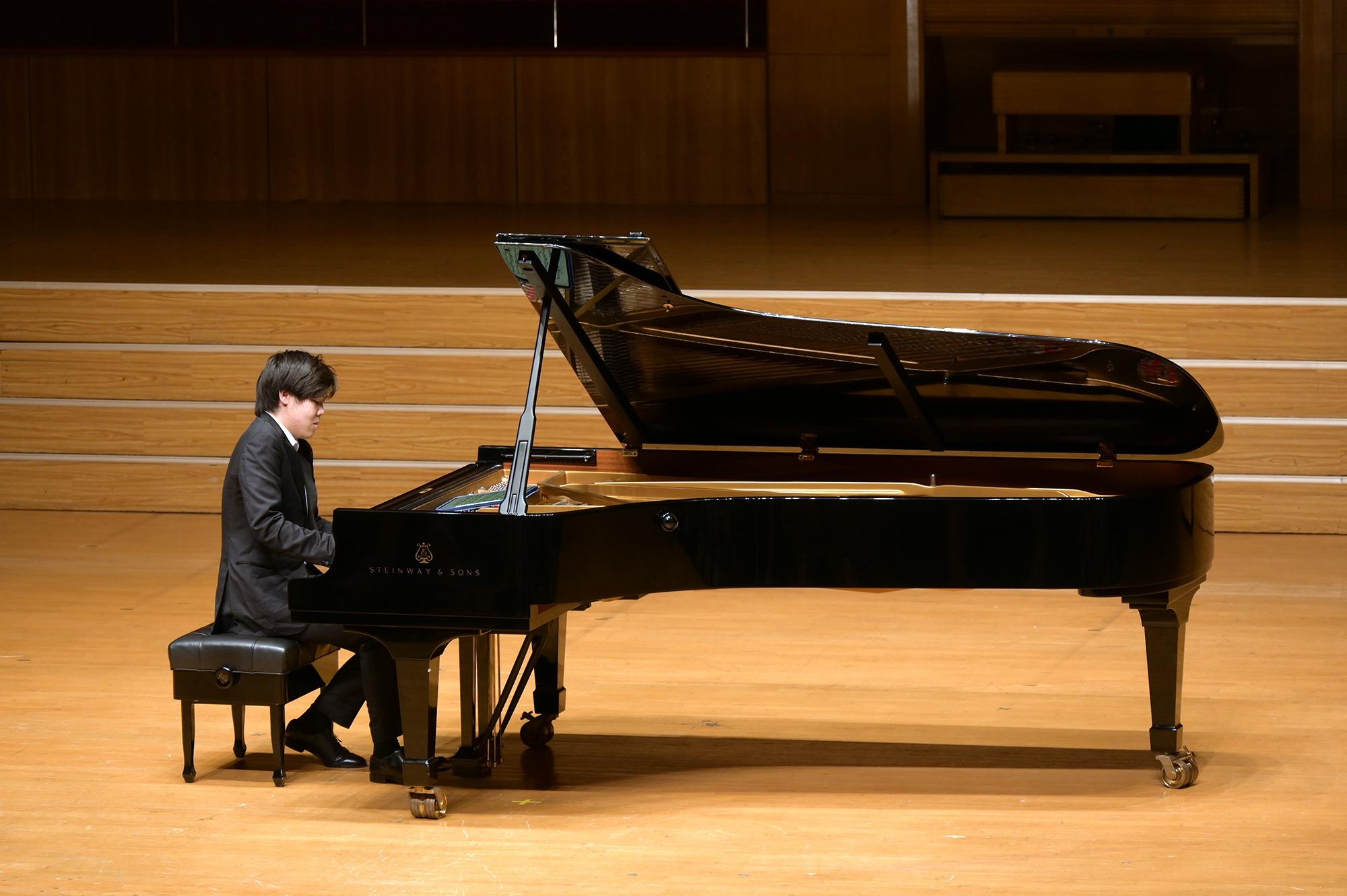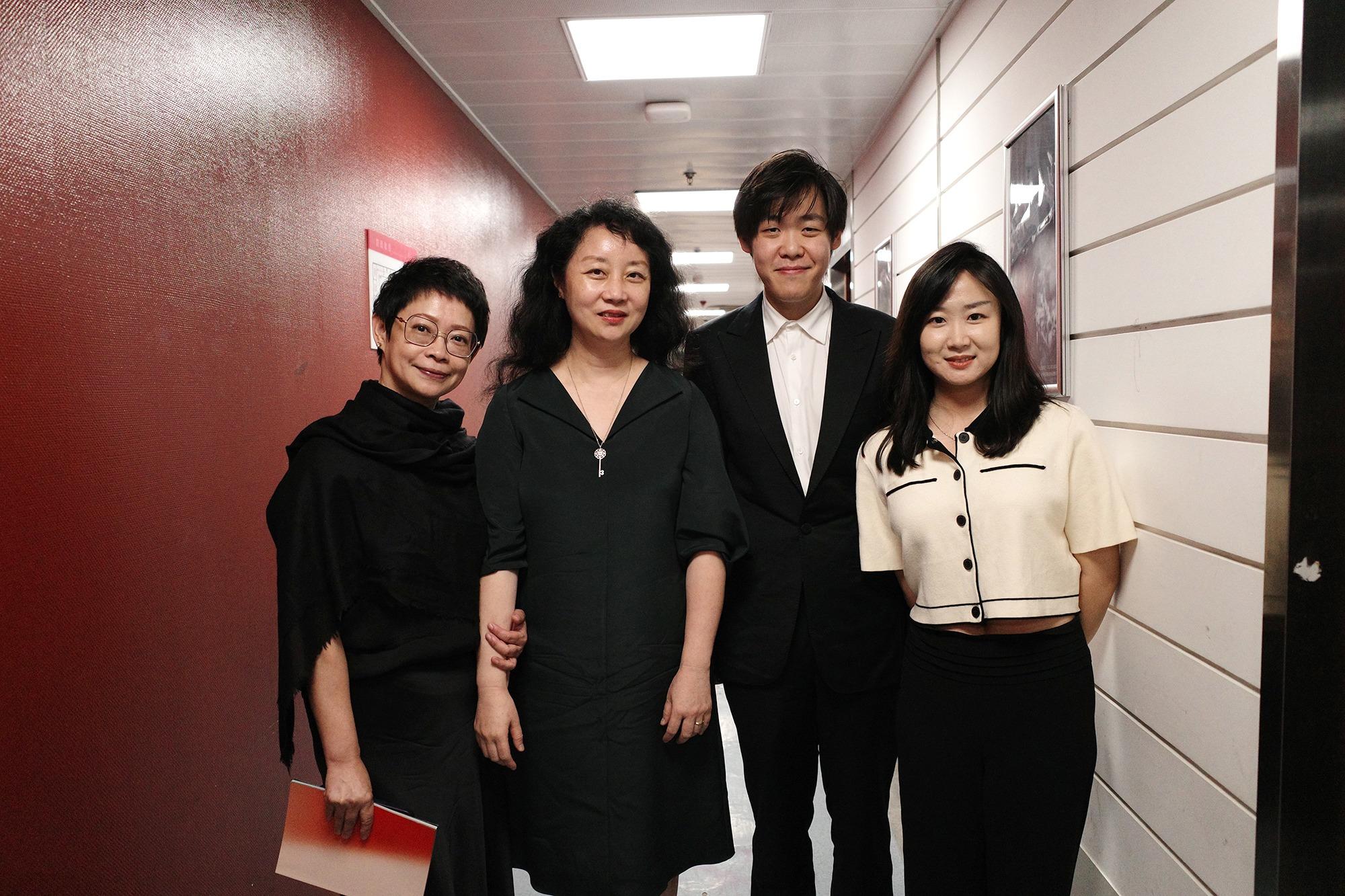Young pianist continues to push the limits of his own expression, Fang Aiqing reports.
 Young pianist Sun Yutong performs German composer Johannes Brahms' last pieces for solo piano at the Beijing Concert Hall on Aug 19. (LI RUI / FOR CHINA DAILY)
Young pianist Sun Yutong performs German composer Johannes Brahms' last pieces for solo piano at the Beijing Concert Hall on Aug 19. (LI RUI / FOR CHINA DAILY)
To celebrate the 190th anniversary of German composer Johannes Brahms' birth, young pianist Sun Yutong was ambitious in leading his audience through pieces from the composer's later years.
Created between 1892 and 1893, the 20 pieces from Op 116-119, ranging from capriccio, intermezzo, romance, rhapsody to ballade, were the composer's last works for solo piano.
I hope, through these piano miniatures, I can bring my audience into the world of Brahms’ introspection of later life.
Sun Yutong, pianist
"I hope, through these piano miniatures, I can bring my audience into the world of Brahms' introspection of later life," Sun said before a recital at the Beijing Concert Hall on Aug 19.
The pieces were written at a time when the composer, having witnessed the passing of family members and close friends, looked back at his own life and reflected on life, love and death.
In contrast to his grand and meticulously structured earlier works, Brahms expressed his most intimate feelings through these short pieces, Sun says.
Usually, musicians play two opuses as half of a recital to balance the time duration. However, Sun played Op 116 first, and after a pause, continued the concert by Op 117-119 without any further intermission.
"I think the latter three pieces are more suitable to be heard together," he says.
While Op 116 is intact with a clear beginning and ending, Op 117 is more like an introduction, and the ascending arpeggios at the end of Op 118 and descending broken chords at the beginning of Op 119 echo one another, he adds.
Like many, the 28-year-old usually has a preference for the midterm and later works of composers, which tend to be considered more mature.
As a young pianist, he would therefore make up for the gap in his age and life experience by reading biographies and history, and learning the composers' earlier works to better understand their consistency in style and changes in mindset.
Brahms' later works reveal the depth of his compositional skill and his inner musings. Unlike his ambitious orchestral compositions, these 20 pieces feel more spontaneous, as if they were created without much deliberation, Sun says.
"For me, the real challenge lies in finding a way to perform them with a simplicity that highlights their essence, rather than getting lost in their complexity."
Sun is also attracted to the interpretations of late Canadian pianist Glenn Gould and Russian pianist Daniil Trifonov, both of whom are known for being good at deconstructing music with which people are familiar.
 Sun and his fiancee Guo Xu (right) pose with their teacher Chang Hua (second left) at the primary and middle schools affiliated to the Central Conservatory of Music in Beijing, and Li Hang (left), executive editor-in-chief of the magazine Piano Artistry. (PHOTO PROVIDED TO CHINA DAILY)
Sun and his fiancee Guo Xu (right) pose with their teacher Chang Hua (second left) at the primary and middle schools affiliated to the Central Conservatory of Music in Beijing, and Li Hang (left), executive editor-in-chief of the magazine Piano Artistry. (PHOTO PROVIDED TO CHINA DAILY)
He quotes his mentor at the New England Conservatory of Music in Boston, Vietnamese-Canadian pianist Dang Thai Son: "In art, we are transparent."
"Playing piano, for me, is to faithfully convey my understanding of the works and the composers and to try my best to maximize personal temperament so that the audience can feel something fresh," Sun says.
The past summer saw him tour around the country, playing in cities including Beijing, Shanghai, Guangzhou and Shenzhen, giving recitals of Brahms and dual piano concerts with his fiancee Guo Xu, a doctoral candidate at the Eastman School of Music in Rochester, featuring the works of Sergei Rachmaninoff. This year also marks the 150th anniversary of the composer's birth.
Chinese audiences got to know Sun through the 18th International Fryderyk Chopin Competition in Warsaw in 2021.
In the first round, he walked onstage, bowed, sat down, adjusted his seat, and without any hesitation, started right away with Chopin's profound Ballade No 1 in G minor, Op 23, delivering it with a sprezzatura expression.
He exited the competition in the second round, though he seldom mentions that he was hit by a car and was injured the day before. On Bilibili, videos of him playing are among the most viewed of all the competitors.
It was also via this competition that Sun's agent Zheng Jian got to know him.
"I was impressed by his casualness and deeply attracted by his understated yet personal renditions, although I was aware that some relatively conservative judges might disagree with him.
"I know the pieces well and I wanted to hear something new, but convincing. He made it," says Zheng, who reached out and invited the young pianist to play some domestic performances.
During last year's Van Cliburn International Piano Competition in Texas, he was the only Chinese candidate to get to the semifinal.
Sun's repertoire spanned major Western classical music periods, from George Frideric Handel's Chaconne in G Major, HWV 435, pieces of Beethoven, Mozart, Chopin and Isaac Albeniz, to contemporary works from Gyorgy Ligeti, Stephen Hough and Carl Vine.
During the previous Van Cliburn competition in 2017, Sun also made it to the semifinal, which proved to be a test of skill, physical and mental power.
"Both the good and bad sides were that I got the same result. I would think more on the good side," he says.
Previously, Sun took second prize at the 2018 Paloma O'Shea Santander International Piano Competition, and in 2012, he became the champion of the 54th International Piano Competition Prize Jaen, both held in Spain.
At a time when thousands upon thousands of piano students around the world strive for a career on a path that is already too crowded, Sun recognizes that major competitions, as well as the potential performing opportunities that followed, were a precious chance to be seen, especially with the assistance of livestreaming and video platforms.
Isolation during the COVID-19 pandemic led to Sun investing more personal ideas into his playing, changing his attitudes toward music and piano competitions, says Guo, who has known Sun since childhood.
This change was largely reflected in his performances at the Chopin competition. Sun used to think his playing of Chopin was too rebellious to match expectations for a "proper" interpretation.
However, feedback from experts, audiences and online comments has strengthened his faith in cultivating his own style.
He made improving his artistic taste and acumen a priority, accumulating extensive classical music literature and a repertoire of different styles, even in preparation for a competition that solely featured Chopin's works.
Therefore, during lockdown, his preparation for the competition usually started with a morning practicing Bach's Well-Tempered Clavier, BWV 846-893, which almost became a ritual. In fact, he learned the whole collection of 48 preludes and fugues.
Now, the time has come for him to take a rest and adjust.
Stepping back from the stages of major international competitions, Sun is enjoying his time polishing his skills and diving deeper into the world of classical music, during which he continues to explore what it is that he really wants to express through his playing.
He is currently pursuing an Artist Diploma at the New England Conservatory of Music under the supervision of Dang Thai Son and Georgian pianist Alexander Korsantia, both of whom are insightful and open-minded, he says.
He's been practicing more pieces by French composers, like Claude Debussy, which are demanding in terms of the texture of the sound, and require a more objective interpretation.
Sun is going to tour more cities at the end of the year, including Ningbo, Nanning, Chengdu and Foshan.
He will work with conductor Sun Yifan and the Ningbo Symphony Orchestra on Rachmaninoff's Rhapsody on a theme of Paganini, Op 43, in the city in Zhejiang province in November.
Together with pianists Chen Sa, Guo and Chang Le, he will also perform Bach concertos for two, three, and four pianos with conductor Lai Jiajing and the China NCPA Orchestra, the resident orchestra of the National Centre for the Performing Arts in Beijing, in July.
Zheng admits that online popularity for young musicians may not necessarily turn into offline performance revenues, so he's grateful that many Chinese theaters and concert halls are willing to give them a chance, which really takes heart and vision.
"I keep telling my young musicians, being a pianist is a lifelong matter. Rising to fame or not, early or late, I can tell from their characteristics that they can both resist temptation and withstand loneliness," the agent says.
Contact the writer at fangaiqing@chinadaily.com.cn


